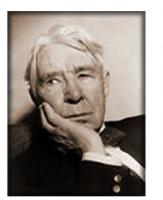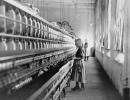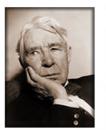"The past is a bucket of ashes"
1
The woman named To-morrow
sits with a hairpin in her teeth
and takes her time
and does her hair the way she wants it
and fastens at last the last braid and coil
and puts the hairpin where it belongs
and turns and drawls: Well, what of it?
My grandmother, Yesterday, is gone.
What of it? Let the dead be dead.
2
The doors were cedar
and the panels strips of gold
and the girls were golden girls
and the panels read and the girls chanted:
We are the greatest city,
the greatest nation:
nothing like us ever was.
The doors are twisted on broken hinges.
Sheets of rain swish through on the wind
where the golden girls ran and the panels read:
We are the greatest city,
the greatest nation,
nothing like us ever was.
3
It has happened before.
Strong men put up a city and got
a nation together,
And paid singers to sing and women
to warble: We are the greatest city,
the greatest nation,
nothing like us ever was.
And while the singers sang
and the strong men listened
and paid the singers well
and felt good about it all,
there were rats and lizards who listened
... and the only listeners left now
... are ... the rats ... and the lizards.
And there are black crows
crying, "Caw, caw,"
bringing mud and sticks
building a nest
over the words carved
on the doors where the panels were cedar
and the strips on the panels were gold
and the golden girls came singing:
We are the greatest city,
the greatest nation:
nothing like us ever was.
The only singers now are crows crying, "Caw, caw,"
And the sheets of rain whine in the wind and doorways.
And the only listeners now are ... the rats ... and the lizards.
4
The feet of the rats
scribble on the door sills;
the hieroglyphs of the rat footprints
chatter the pedigrees of the rats
and babble of the blood
and gabble of the breed
of the grandfathers and the great-grandfathers
of the rats.
And the wind shifts
and the dust on a door sill shifts
and even the writing of the rat footprints
tells us nothing, nothing at all
about the greatest city, the greatest nation
where the strong men listened
and the women warbled: Nothing like us ever was.
1
The woman named To-morrow
sits with a hairpin in her teeth
and takes her time
and does her hair the way she wants it
and fastens at last the last braid and coil
and puts the hairpin where it belongs
and turns and drawls: Well, what of it?
My grandmother, Yesterday, is gone.
What of it? Let the dead be dead.
2
The doors were cedar
and the panels strips of gold
and the girls were golden girls
and the panels read and the girls chanted:
We are the greatest city,
the greatest nation:
nothing like us ever was.
The doors are twisted on broken hinges.
Sheets of rain swish through on the wind
where the golden girls ran and the panels read:
We are the greatest city,
the greatest nation,
nothing like us ever was.
3
It has happened before.
Strong men put up a city and got
a nation together,
And paid singers to sing and women
to warble: We are the greatest city,
the greatest nation,
nothing like us ever was.
And while the singers sang
and the strong men listened
and paid the singers well
and felt good about it all,
there were rats and lizards who listened
... and the only listeners left now
... are ... the rats ... and the lizards.
And there are black crows
crying, "Caw, caw,"
bringing mud and sticks
building a nest
over the words carved
on the doors where the panels were cedar
and the strips on the panels were gold
and the golden girls came singing:
We are the greatest city,
the greatest nation:
nothing like us ever was.
The only singers now are crows crying, "Caw, caw,"
And the sheets of rain whine in the wind and doorways.
And the only listeners now are ... the rats ... and the lizards.
4
The feet of the rats
scribble on the door sills;
the hieroglyphs of the rat footprints
chatter the pedigrees of the rats
and babble of the blood
and gabble of the breed
of the grandfathers and the great-grandfathers
of the rats.
And the wind shifts
and the dust on a door sill shifts
and even the writing of the rat footprints
tells us nothing, nothing at all
about the greatest city, the greatest nation
where the strong men listened
and the women warbled: Nothing like us ever was.
envoyé par Bartleby - 26/1/2011 - 11:26
Langue: italien
Tentativo di traduzione italiana di Bartleby.
QUATTRO PRELUDI SUI BALOCCHI DEL VENTO
“Il passato è un secchio di cenere”
1
La donna di nome “A domani”
si siede con una forcina tra i denti
e tira il fiato
e si fa su i capelli come vuole
e fissa finalmente l’ultima treccia e crocchia
e mette la forcina al suo posto
si gira e biascica: Beh, allora?
Mia nonna, “Ieri”, se n’è andata.
E allora? Lascia che i morti siano morti.
2
Le porte erano di cedro
rivestite d'oro
e le ragazze erano showgirls
e sulle porte si leggeva e le ragazze cantavano:
“Siamo la città più grande,
la più grande nazione:
non è mai esistito nessuno come noi!”
Le porte sono tutte scassate, le cerniere rotte.
Turbini di pioggia sibilano con il vento
Là dove vivevano le showgirls e dove si leggeva:
“Siamo la città più grande,
la più grande nazione:
non è mai esistito nessuno come noi!”
3
Ecco quanto accadde prima.
Uomini potenti fondarono una città e formarono insieme una nazione,
e pagarono cantanti per cantare e donne per cinguettare:
“Siamo la città più grande,
la più grande nazione:
non è mai esistito nessuno come noi!”
E mentre i cantanti cantavano
e gli uomini potenti ascoltavano
pagandoli profumatamente
e tutti se la spassavano,
c’erano ratti e lucertole che ascoltavano
… e gli unici rimasti ad ascoltare ora
... sono... i ratti... e le lucertole.
E ci sono corvi neri
che gridano, “cra, cra,”
portando fango e legnetti
costruiscono un nido
sulle parole scolpite sulle porte di legno di cedro rivestite d’oro
dove le showgirls se ne stavano cantando: “Siamo la città più grande,
la più grande nazione:
non è mai esistito nessuno come noi!”
I soli a cantare sono ora i corvi che gridano, “cra, cra,”
ed i turbini di pioggia che ululano con il vento
tra le porte.
Ed i soli ad ascoltare ora sono... i ratti... e le lucertole.
4
Le zampe dei ratti
disegnano geroglifici di impronte di topo
sulle soglie
si chiacchiera dei pedigree dei ratti
si barbuglia del sangue
e si farfuglia della razza
dei nonni e dei bisnonni dei ratti.
E nè le folate di vento
Né la polvere soffiata via dalle soglie
e nemmeno i disegni delle impronte dei ratti
ci dicono nulla, niente di niente
a proposito della città più grande, della più grande nazione
dove gli uomini potenti ascoltavano
e le donne cinguettavano: “Non è mai esistito nessuno come noi!”
“Il passato è un secchio di cenere”
1
La donna di nome “A domani”
si siede con una forcina tra i denti
e tira il fiato
e si fa su i capelli come vuole
e fissa finalmente l’ultima treccia e crocchia
e mette la forcina al suo posto
si gira e biascica: Beh, allora?
Mia nonna, “Ieri”, se n’è andata.
E allora? Lascia che i morti siano morti.
2
Le porte erano di cedro
rivestite d'oro
e le ragazze erano showgirls
e sulle porte si leggeva e le ragazze cantavano:
“Siamo la città più grande,
la più grande nazione:
non è mai esistito nessuno come noi!”
Le porte sono tutte scassate, le cerniere rotte.
Turbini di pioggia sibilano con il vento
Là dove vivevano le showgirls e dove si leggeva:
“Siamo la città più grande,
la più grande nazione:
non è mai esistito nessuno come noi!”
3
Ecco quanto accadde prima.
Uomini potenti fondarono una città e formarono insieme una nazione,
e pagarono cantanti per cantare e donne per cinguettare:
“Siamo la città più grande,
la più grande nazione:
non è mai esistito nessuno come noi!”
E mentre i cantanti cantavano
e gli uomini potenti ascoltavano
pagandoli profumatamente
e tutti se la spassavano,
c’erano ratti e lucertole che ascoltavano
… e gli unici rimasti ad ascoltare ora
... sono... i ratti... e le lucertole.
E ci sono corvi neri
che gridano, “cra, cra,”
portando fango e legnetti
costruiscono un nido
sulle parole scolpite sulle porte di legno di cedro rivestite d’oro
dove le showgirls se ne stavano cantando: “Siamo la città più grande,
la più grande nazione:
non è mai esistito nessuno come noi!”
I soli a cantare sono ora i corvi che gridano, “cra, cra,”
ed i turbini di pioggia che ululano con il vento
tra le porte.
Ed i soli ad ascoltare ora sono... i ratti... e le lucertole.
4
Le zampe dei ratti
disegnano geroglifici di impronte di topo
sulle soglie
si chiacchiera dei pedigree dei ratti
si barbuglia del sangue
e si farfuglia della razza
dei nonni e dei bisnonni dei ratti.
E nè le folate di vento
Né la polvere soffiata via dalle soglie
e nemmeno i disegni delle impronte dei ratti
ci dicono nulla, niente di niente
a proposito della città più grande, della più grande nazione
dove gli uomini potenti ascoltavano
e le donne cinguettavano: “Non è mai esistito nessuno come noi!”
envoyé par Bartleby - 26/1/2011 - 11:27
×
![]()








Dalla raccolta poetica “Smoke and Steel”
Musica del compositore americano Joseph Kantor, pubblicata nel 1976
Trovata su The Lied, Art Song and Choral Texts Page
Dedicata agli uomini potenti ed alle loro sordide e tristi corti...